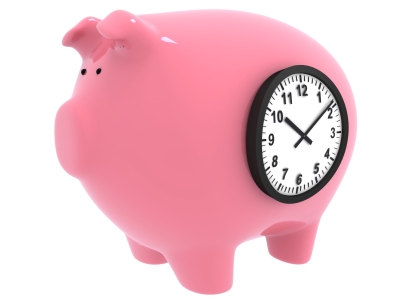
Did you know you can create a time budget just like you do for your money? Yes, it’s true. Time, just like money, needs to be budgeted. When you budget your time, you know exactly where it’s going and you can control it. Luckily, time budgeting is much easier than planning your finances.
Do you find yourself wondering where the time went each day? Most of us wish we had more time but there are only 24 hours in a day. Chances are, the time you need is there (along with sleep time, too!) but you’re just not using it as productively as you should be. Here’s how you create a time budget.
Budgeting Your Day
Start by deciding how much time you want to spend on each task per day. Make a rough estimate of how long it will take and always add a little extra. Things usually take longer than you realize and that extra bit of time gives you a cushion. If you end up not needing the extra, you’ll feel like you’re getting things done more quickly.
Prioritize your daily tasks. Ask yourself, ‘If I only manage to accomplish 3 things today, what should they be?’ Of course, you’re hopefully going to get much more than that done, but prioritizing helps you to get the most important things done first.
Use a timer to time each task. When you use a timer, you don’t have to watch the clock. Just set the time and let it tell you when the time is up. The timer also helps you psychologically because while it’s running, you feel like you need to be on task.
Budgeting Your Days and Weeks
You can apply the same method above to create a time budget for your weekly and monthly schedule as well. This is a little bit trickier and requires more flexibility on your part. The reason is that it’s harder to tell how long something is going to take when you’re dealing in days or weeks rather than hours.
Start by establishing the deadline. When does the particular task need to be finished? Bump it forward one day to give yourself a little leeway for unforeseen situations. If something unexpected happens and you run a day late, you’ll still be on time.
Between today and the deadline, how many days do you have? Only include days you’ll work. Divide the task up into the number of days and if possible, set small achievable goals for each day. Then, decide how long you think it will take per day using the method above.
Monitor and Stay Flexible
Your time budgeting will be inaccurate at first for the simple reason that you may not have an idea of how long each task really takes. You can improve your accuracy by monitoring. Log the time you spend on tasks. This seems like extra work that you just don’t need when you’re trying to be more efficient. But you’ll end up with a more realistic picture of your schedule, which will increase your efficiency in the long run.
Remember to keep yourself flexible. Stick closely to your budget but don’t hesitate to make adjustments if they’re necessary. For example, if you discover that a certain task takes much longer than you realized, change your schedule and budget more time for it. Always be on the lookout for new ideas on how to make your time management more efficient as well.
